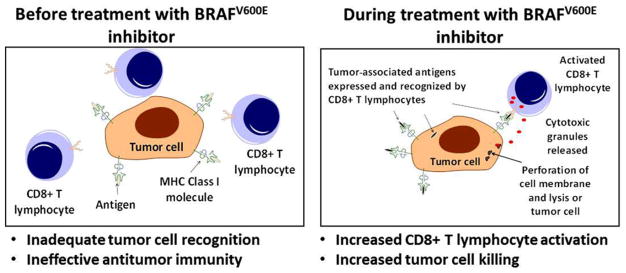Figure 3.
Targeted therapies can increase expression of tumor-associated antigens. Targeted therapies may influence antitumor immunity by increasing the expression of tumor-associated antigens that can be recognized by host T lymphocytes. Before treatment (left panel) the tumor cell is not recognized by host T lymphocytes. In response to treatment with a BRAFV600E inhibitor (right panel) there is a change in the expression of tumor-associated antigens derived from melanocyte differentiation antigens that can promote the recognition of tumor cells by T lymphocytes. The recognition of tumor-associated antigens by T lymphocytes facilitates their activation and the generation of an antitumor immune response.

